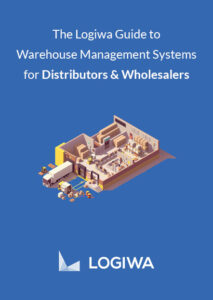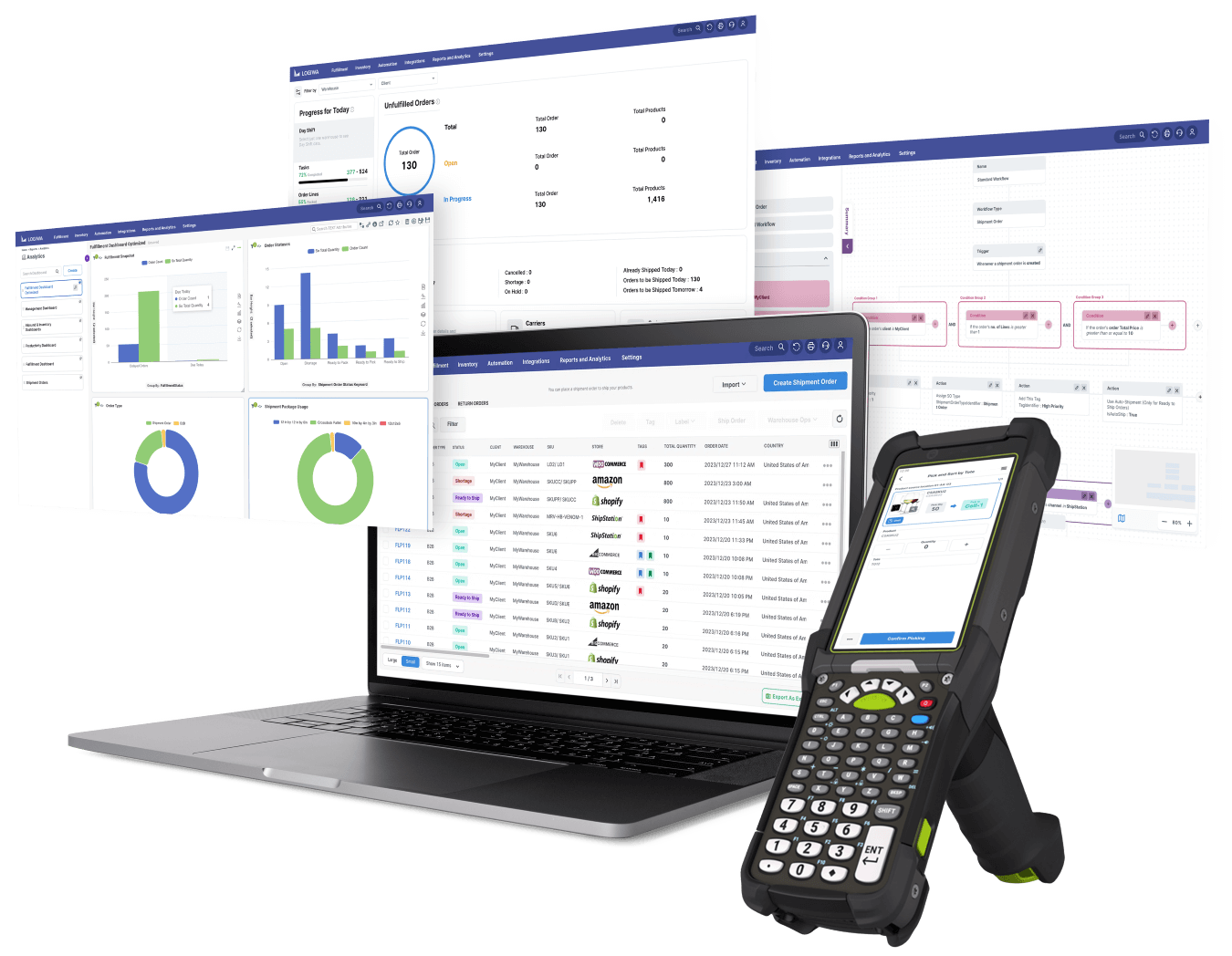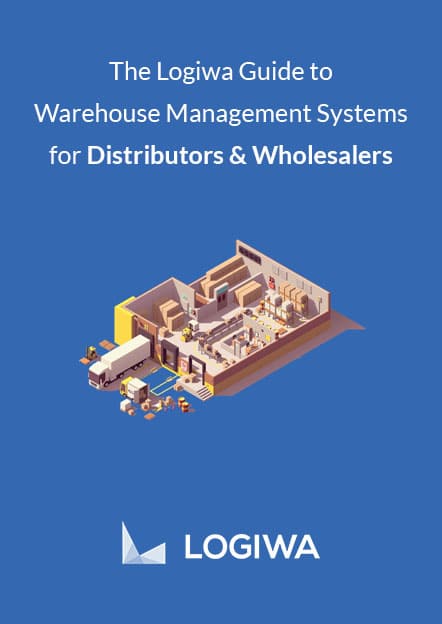Logiwa Guide
All You Need to Know About Warehouse Management Systems for Distributors & Wholesalers
As a distribution or wholesale warehouse operator, you have specific needs when it comes to how you manage your warehouse. Do you work with business-to-business (B2B) or business-to-consumer (B2C) customers? Maybe you need to establish prioritization protocols, have multiple warehouses, use seasonal workers, or want to grow your business.
If you nodded your head to any of these, you need a robust warehouse management system (WMS) that fits with your operational needs.
We’ve created a warehouse management systems guide to help you make a business case for your leadership and IT team. You can use it to implement warehouse and inventory management software in your business and choose the best software to meet your business needs.
Complete the form below to receive this content:
Distributors and Wholesalers Face Unique Warehousing Challenges
The global increase in ecommerce and online shopping creates unique warehouse challenges for distributors and wholesalers. You want to grow your business to meet the increasing demand, but you want to maintain a high level of customer satisfaction.
Many B2B organizations are creating new lines of business in the direct-to-customer (DTC) space and are looking to you to help them meet those unique needs. However, your current wholesale distribution software likely isn’t flexible enough to support these high-volume orders and shipments, putting you (and your client) at a disadvantage when trying to compete with the popular ecommerce systems. In order to meet these new demands, you need to hire more employees, which costs you money.
That’s why you need warehouse and inventory management software built to help wholesalers, distributors, third-party logistics (3PL) providers, brands, and online sellers scale-up direct-to-consumer fulfillment operations. Our wms software guide will help you identify the right system to help you build smart warehousing operations that fit your type and size of business.
Warehouse Management Systems Guide – Your Guide to Improved Warehouse Operations
Wholesale distribution software is a solution that allows you to manage data such as inventory management, picking, packaging, order management, shipping, production, and CRM, which are critical business processes. At the same time, it speeds up your operations by allowing you to manage these processes from an easy-to-use cloud-based system from anywhere.
Our handy warehouse management systems guide includes information on how to use warehouse and inventory management software to help you grow your business and available integrations with popular accounting and customer relationship management systems. It also provides ecommerce and shipping companies and guidance on how to use the software with technology you currently use in your warehouses.
If you’re planning to add new warehouses or new customers, our warehouse management systems guide shows you what’s possible with just a few clicks of a button.
What Will I Learn in This Warehouse Management Systems Guide?
Our WMS software guide will provide information on:
-
- What a warehouse management system is
- The primary functions of a WMS for distributors and wholesalers
- Common challenges for distributors and wholesalers and how a WMS can help
- How a WMS can help support the B2C, B2B, and DTC order fulfillment processes
- How a WMS can help grow your business
Specifically, our WMS software guide will look at common challenges for distributors and wholesalers, such as:
-
- Customer prioritization and rules
- Space optimization
- Temporary or seasonal workers and incorporating “bring-your-own-device” (BYOD) capabilities
- Wave planning to meet pick-up and shipping requirements from carriers
Types of Warehouse Management Systems
There are five common types of warehouse management systems on the market. To determine the best system for your operations, you’ll need to review your current operational processes and needs and how you want your business to grow.
Application mega-suite vendors offer a wide range of enterprise resource management (ERP) applications, including inventory, warehouse management, human resources, customer relationship management, order management, reporting, and accounting.
Supply chain management (SCM) suite vendors support supply chain management functions, not just warehousing operations. This software helps organizations manage all processes in the supply chain function, including vendor relationships, business processes, and risk management, focusing on automating inventory management, material sourcing, and product cycles.
Specialist WMS suite vendors include companies like Logiwa. These independent software vendors focus primarily on well-rounded warehouse management system suites. These systems often provide smart warehousing functionality to use technology to perform many of the tasks commonly done by humans.
Independent WMS component vendors are useful for warehouses with some software in place to manage specific functions. Independent component vendors can provide stand-alone products to supplement your current WMS.
Material handling equipment and automation vendors specifically support the electromechanical aspects of large-scale, automated warehouses, including conveyor systems, lifts, and other machinery in a warehouse.
Warehouse Management System Solutions for Distributors & Wholesalers
Unlike traditional warehouse management systems, warehouse fulfillment software for distributors and wholesalers must provide order fulfillment and order management capabilities for B2C and B2B operations while allowing you to expand into the growing demand for DTC operations.
We’re confident that our software will meet your current and future operational needs, help you better serve your clients and customers, and allow your business to grow to meet the ever-increasing global ecommerce demand, all without increasing headcount.
Additionally, our software is easy to integrate with many of the tools and systems you currently use, allowing you to get up and running in as little as four weeks.
Download our WMS software guide to learn more about our warehouse fulfillment software. We know it will be a helpful tool to determine your business needs and make a business case for your IT team and your CEO.
Download the warehouse management systems guide now.
If you’re interested in learning more, please contact a member of our sales team or request a free product demo.
Warehouse Management System Guide for Distributors & Wholesalers
Get the guide that outlines the best practices you need to speed high-volume DTC fulfillment.

Distributors and Wholesalers Face Unique Warehousing Challenges
As a distribution or wholesale warehouse operator, you have specific needs when it comes to how you manage your warehouse. Do you work with business-to-business (B2B) or business-to-consumer (B2C) customers? Maybe you need to establish prioritization protocols, have multiple warehouses, use seasonal workers, or want to grow your business.
If you nodded your head to any of these, you need a robust warehouse management system (WMS) that fits with your operational needs.
We’ve created a warehouse management systems guide to help you make a business case for your leadership and IT team. You can use it to implement warehouse and inventory management software in your business and choose the best software to meet your business needs.
The global increase in ecommerce and online shopping creates unique warehouse challenges for distributors and wholesalers. You want to grow your business to meet the increasing demand, but you want to maintain a high level of customer satisfaction.
Many B2B organizations are creating new lines of business in the direct-to-customer (DTC) space and are looking to you to help them meet those unique needs. However, your current wholesale distribution software likely isn’t flexible enough to support these high-volume orders and shipments, putting you (and your client) at a disadvantage when trying to compete with the popular ecommerce systems. In order to meet these new demands, you need to hire more employees, which costs you money.
That’s why you need warehouse and inventory management software built to help wholesalers, distributors, third-party logistics (3PL) providers, brands, and online sellers scale-up direct-to-consumer fulfillment operations. Our wms software guide will help you identify the right system to help you build smart warehousing operations that fit your type and size of business.
Warehouse Management Systems Guide – Your Guide to Improved Warehouse Operations
Wholesale distribution software is a solution that allows you to manage data such as inventory management, picking, packaging, order management, shipping, production, and CRM, which are critical business processes. At the same time, it speeds up your operations by allowing you to manage these processes from an easy-to-use cloud-based system from anywhere.
Our handy warehouse management systems guide includes information on how to use warehouse and inventory management software to help you grow your business and available integrations with popular accounting and customer relationship management systems. It also provides ecommerce and shipping companies and guidance on how to use the software with technology you currently use in your warehouses.
If you’re planning to add new warehouses or new customers, our warehouse management systems guide shows you what’s possible with just a few clicks of a button.
What Will I Learn in This Warehouse Management Systems Guide?
Our WMS software guide will provide information on:
-
- What a warehouse management system is
- The primary functions of a WMS for distributors and wholesalers
- Common challenges for distributors and wholesalers and how a WMS can help
- How a WMS can help support the B2C, B2B, and DTC order fulfillment processes
- How a WMS can help grow your business
Specifically, our WMS software guide will look at common challenges for distributors and wholesalers, such as:
-
- Customer prioritization and rules
- Space optimization
- Temporary or seasonal workers and incorporating “bring-your-own-device” (BYOD) capabilities
- Wave planning to meet pick-up and shipping requirements from carriers
Types of Warehouse Management Systems
There are five common types of warehouse management systems on the market. To determine the best system for your operations, you’ll need to review your current operational processes and needs and how you want your business to grow.
Application mega-suite vendors offer a wide range of enterprise resource management (ERP) applications, including inventory, warehouse management, human resources, customer relationship management, order management, reporting, and accounting.
Supply chain management (SCM) suite vendors support supply chain management functions, not just warehousing operations. This software helps organizations manage all processes in the supply chain function, including vendor relationships, business processes, and risk management, focusing on automating inventory management, material sourcing, and product cycles.
Specialist WMS suite vendors include companies like Logiwa. These independent software vendors focus primarily on well-rounded warehouse management system suites. These systems often provide smart warehousing functionality to use technology to perform many of the tasks commonly done by humans.
Independent WMS component vendors are useful for warehouses with some software in place to manage specific functions. Independent component vendors can provide stand-alone products to supplement your current WMS.
Material handling equipment and automation vendors specifically support the electromechanical aspects of large-scale, automated warehouses, including conveyor systems, lifts, and other machinery in a warehouse.
Warehouse Management System Solutions for Distributors & Wholesalers
Unlike traditional warehouse management systems, warehouse fulfillment software for distributors and wholesalers must provide order fulfillment and order management capabilities for B2C and B2B operations while allowing you to expand into the growing demand for DTC operations.
We’re confident that our software will meet your current and future operational needs, help you better serve your clients and customers, and allow your business to grow to meet the ever-increasing global ecommerce demand, all without increasing headcount.
Additionally, our software is easy to integrate with many of the tools and systems you currently use, allowing you to get up and running in as little as four weeks.
Download our WMS software guide to learn more about our warehouse fulfillment software. We know it will be a helpful tool to determine your business needs and make a business case for your IT team and your CEO.
Download the warehouse management systems guide now.
If you’re interested in learning more, please contact a member of our sales team or request a free product demo.


